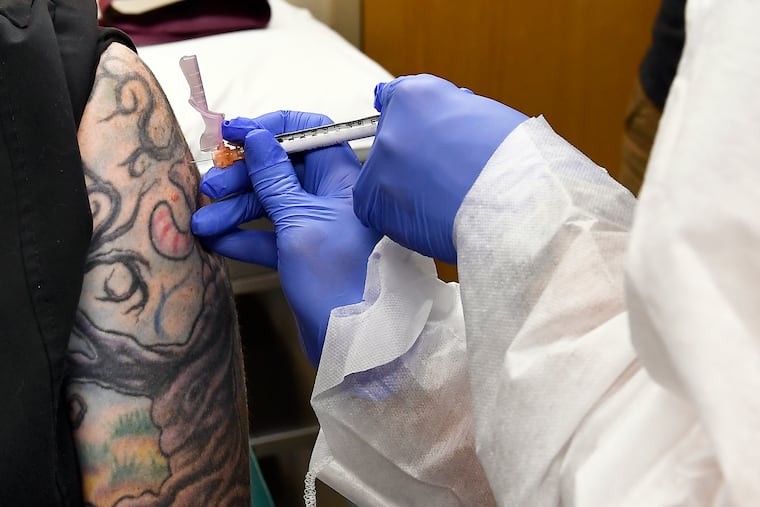Health care workers are top priority to get the COVID-19 vaccine, but not all want it, or must get it
Being top priority to get a novel vaccine against a deadly virus may be a mixed blessing.

A federal vaccine advisory committee on Tuesday recommended that health care workers be top priority for a COVID-19 vaccine because of their crucial jobs and high risk of exposure to the coronavirus.
But surveys suggest many doctors and nurses do not want to be among the first to roll up their sleeves for an immunization brought to market at breakneck speed.
That raises an obvious question: Can hospitals mandate COVID-19 vaccination as a condition of employment, the way they require seasonal flu shots?
The answer is probably not, at least not initially, because the vaccines will not be fully licensed. Pfizer and Moderna, makers of the first two candidates, are seeking emergency use authorization (EUA) from the Food and Drug Administration. It requires less evidence of safety and effectiveness than full approval, and both vaccines may be granted EUA status by the end of the month.
Then again, the statutory provision that covers EUA has ambiguities, and may leave room for vaccine mandates, said Dorit Rubinstein Reiss, a professor at the University of California Hastings College of the Law.
“As part of granting an EUA, the Secretary [of Health and Human Services] has to directly address whether private businesses may impose mandates, and with what exceptions,” she wrote in a recent blog post.
» READ MORE: Advisory group targets health workers, nursing home residents for first doses of COVID-19 vaccine
In any case, hospitals may prefer to persuade, rather than push, their workers.
“Temple University Health System does not currently plan to mandate that employees receive a COVID-19 vaccination,” a spokesperson emailed. “Our preference is to educate employees on the vaccine and to address any concerns or fears they may have about it in hope that they in turn may become messengers of the value of vaccination.”
Penn Medicine has an advisory board working on a plan for distributing vaccine allotments, which are expected to be limited in the beginning. “At this time, vaccination will be voluntary, and we will continue to refine our policies following FDA approval and greater availability of vaccines,” a spokesperson emailed.
Jefferson Health, which also has a planning committee, said in a statement, “Initially, we will not have sufficient supplies to provide vaccination to our entire workforce. The vaccine will be voluntary.”
Compulsory flu shots for workers in hospitals and nursing homes have become common, fueled by the 2009 H1N1 “swine flu” pandemic. Even so, research has not conclusively shown that vaccinating workers reduces patients’ flu-related illness and death.
Workers can get exemptions for religious or medical reasons such as allergies. Some nurses unions have sued over the mandates. For the most part, though, the relevant laws give employers discretion to hire and fire at will.
» READ MORE: Britain authorizes Pfizer coronavirus vaccine for emergency use
The situation is different for medical products granted an EUA under the federal Food, Drug and Cosmetics Act.
“That adds a legal complication,” Reiss said in an interview. “It’s also an ethical issue because, technically, an EUA product is still experimental.”
The EUA provision says individuals must be told they can refuse an emergency-authorized medical product.
But the provision also says that as part of granting an EUA, the Secretary of Health and Human Services — not the FDA — must spell out the consequences, if any, of refusal. Hypothetically, a consequence could be the loss of a job.
“It suggests that the Secretary has the discretion to allow such consequences — and hence, to permit mandates,” Reiss wrote.
Health workers have expressed hesitancy about getting a COVID-19 vaccine early on — not because they oppose immunizations or believe anti-vaccine misinformation, but because they want to see a longer track record of safety and effectiveness. The Pfizer and Moderna vaccines both use novel technology, and went from drawing boards to clinical trials in less than a year.
The companies have released data showing their shots are more than 90% effective — far better than expected — and volunteers have had no serious side effects.
» READ MORE: A COVID-19 vaccine may be near, but distribution faces major hurdles
Whether or not that will reassure health workers remains to be seen. An American Nurses Association survey found that a third of its members do not plan to get the vaccine. In New Jersey, a health department poll found about a third of doctors did not want to be vaccinated, at least not in the first round.
“Many said they would be more than willing to get the vaccine at a later date, when more data is available,” New Jersey Health Commissioner Judith M. Persichilli said at a news briefing last month.
Philadelphia Health Commissioner Thomas Farley said on Tuesday that “it’s early to talk about mandating vaccines,” but it might make sense for certain workers in the future.
“It’s possible in some settings that we would require it or that the organization would require it,” he said. “For example, nursing homes, which are sort of ground zero for this epidemic. It might make sense for the staff there to be required to be vaccinated.”